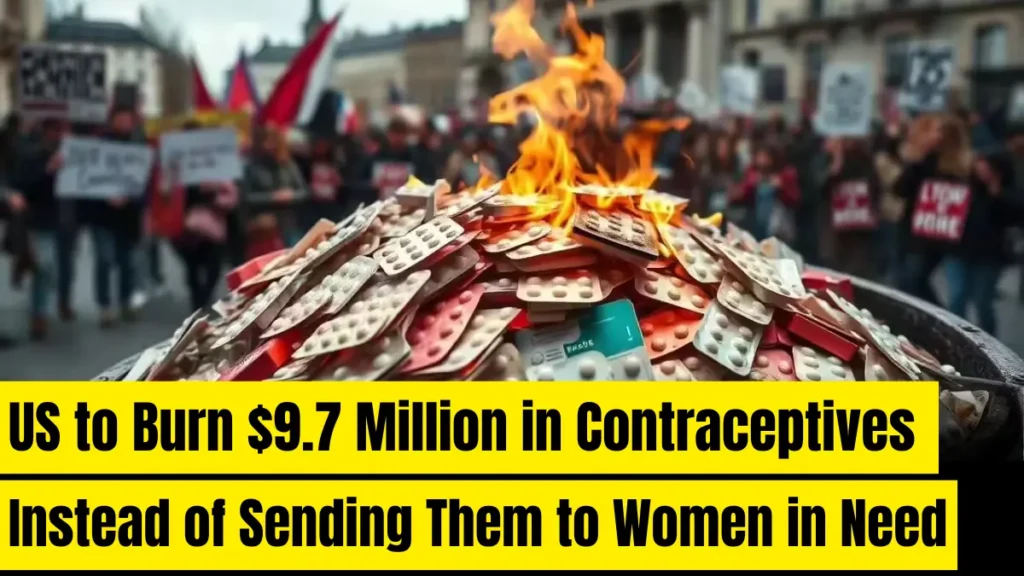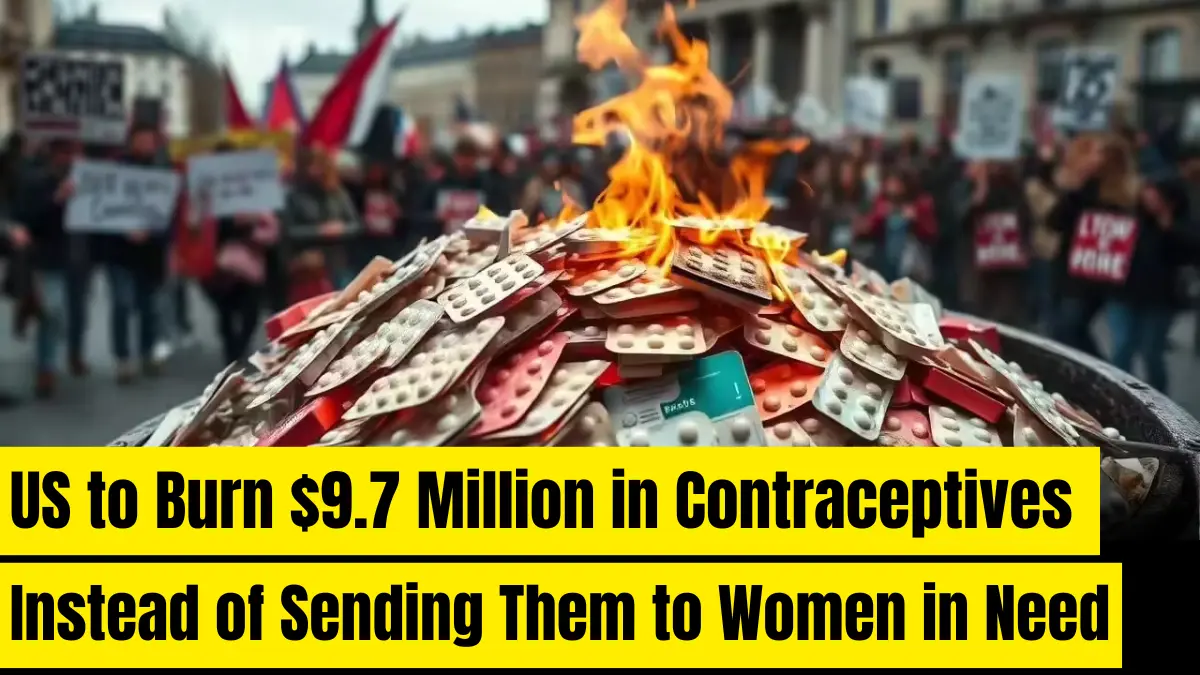The US plans to destroy $9.7M in contraceptives under a Trump-era policy, sparking backlash from aid groups, health experts, and lawmakers. Here’s what it means for global health.
Table of Contents
US to Burn $9.7 Million in Contraceptives Instead of Sending Them to Women in Need
The decision to destroy nearly $10 million worth of contraceptives has set off a political firestorm—and it could have global consequences.
In a move that’s left global health organizations stunned and reproductive rights advocates furious, the U.S. government is preparing to destroy $9.7 million worth of contraceptives procured by the United States Agency for International Development (USAID).
This “preliminary decision,” confirmed by the State Department, involves nearly 5 million items—including IUDs, birth control injections, and contraceptive pills—stored in a warehouse in Geel, Belgium. The official cost of incineration? A staggering $167,000.
But experts warn the true cost is much higher.
🔥 A Literal Bonfire of Taxpayer Dollars
“The Trump administration is quite literally burning taxpayer money,” one U.S. congressional aide told CNN.
The contraceptives, many of which don’t expire until 2028 or later, were originally purchased to support reproductive health efforts in developing countries. Instead, they now face destruction due to Trump-era foreign aid rollbacks and political restrictions that label some forms of birth control as “abortifacients.”
The products require double incineration due to their hormonal content, which raises environmental and ethical concerns as well.
⚖️ Controversy Over “Abortifacients”
At the center of this issue lies the highly politicized debate over what constitutes an “abortifacient.” The State Department claims the contraceptives fall under this category, citing “terminated Biden-era USAID contracts.”
But according to the American College of Obstetricians and Gynecologists (ACOG), the classification is scientifically incorrect.
“There is no such thing as an abortifacient contraceptive,” ACOG said. “IUDs and other forms of birth control do not cause abortion. Any suggestion otherwise is misinformation.”
Yet, this classification is being used to justify the destruction of life-saving supplies.
🌍 Global Impact: From Sudan to Congo
While the debate rages in Washington, the real-world consequences are playing out in countries like Sudan, Afghanistan, and the Democratic Republic of Congo, where women depend on USAID-supported clinics.
Organizations like Doctors Without Borders (MSF) have already reported stockouts and disruptions in contraceptive access.
“MSF has seen firsthand the dangerous consequences when women cannot freely make their own reproductive choices,” said Avril Benoît, CEO of MSF USA.
🚫 Offers to Save the Supplies Were Rejected
It wasn’t for lack of trying. Several aid organizations, including MSI Reproductive Choices, offered to pay for the shipping and rebranding of the USAID contraceptives. Their proposal? Save the supplies and deliver them to women who need them.
But the US government refused.
“We were not given a reason,” said MSI spokeswoman Grace Dunne. “It became clear our efforts would be better spent elsewhere.”
🇧🇪 Belgium Urges US to Rethink
Belgium, where the contraceptives are currently warehoused, is actively pushing back.
“We are exploring all possible avenues to prevent the destruction of these stocks,” said Florinda Baleci, a spokeswoman for the Belgian foreign ministry.
Belgian officials are even considering temporarily relocating the contraceptives to buy time and avoid unnecessary waste.
🧾 Lawmakers Take Action
Senator Jeanne Shaheen (D-NH) has already taken steps to prohibit the destruction of USAID-purchased contraceptives. A member of her staff visited the warehouse in Belgium and confirmed the items were usable for years to come—with some not expiring until 2031.
“These commodities would save lives,” Shaheen said. “It is deeply disappointing that the State Department would rather burn them.”
Shaheen plans to introduce legislation that would require all donation and resale options be exhausted before any USAID-purchased items are destroyed.
🚪 The Fall of USAID
This controversy comes in the wake of the rapid dismantling of USAID under the Trump administration. In July, Secretary of State Marco Rubio declared that USAID would be replaced by more “policy-aligned” foreign aid programs managed directly by the State Department.
The move has drawn intense scrutiny.
A study published in The Lancet estimated that USAID cuts could result in over 14 million additional deaths by 2030, with HIV/AIDS and malaria prevention programs hit hardest.
🤐 The “Global Gag Rule” in Play
The refusal to donate or distribute the contraceptives is also tied to the “Mexico City Policy”, better known as the “Global Gag Rule.”
This policy bans U.S. funding for any organization that provides or promotes abortion—even if abortion services are only one part of what they do.
Critics argue that this rule leads to a chilling effect on global health organizations, preventing them from even mentioning abortion and limiting the services they can offer with or without U.S. funding.
📦 What’s Still Unknown?
CNN reports that more USAID-branded contraceptives may be sitting in a warehouse in the United Arab Emirates. The U.S. government has not clarified what will happen to those supplies.
Meanwhile, reproductive health needs continue to rise around the globe.
🧠 The Bigger Picture
This story is about more than just burning contraceptives.
It’s about:
- How political ideology can override science and humanitarian needs
- How foreign aid decisions made in D.C. ripple across continents
- How American taxpayer dollars are being spent—or destroyed
And most of all, it’s about who pays the price when healthcare becomes political.
🔍 Frequently Asked Questions (FAQ)
1. Why is the US destroying contraceptives purchased by USAID?
The destruction is tied to the rollback of Biden-era foreign aid contracts and a reinterpretation of certain contraceptives as “abortifacients,” a scientifically disputed term.
2. Can the contraceptives still be used?
Yes. Most of the items don’t expire until 2028 or later. Some are good until 2031.
3. Were any organizations willing to save the supplies?
Yes. MSI Reproductive Choices and other partners offered to ship and repackage the supplies, but their offer was declined.
4. What is the Mexico City Policy?
Also known as the “Global Gag Rule,” it bans U.S. funding for foreign NGOs that provide or promote abortion services, directly or indirectly.
5. What impact will this decision have?
It could worsen global contraceptive shortages, especially in war-torn and impoverished nations, and may contribute to unintended pregnancies and maternal deaths.

